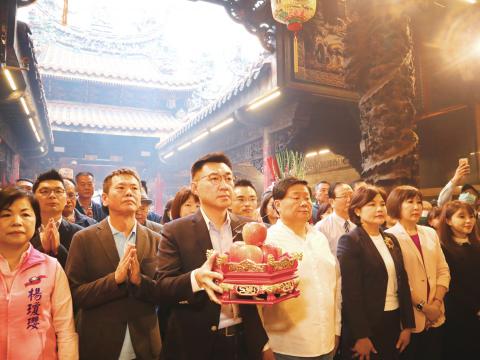It is “not necessarily a bad thing” that newly elected Chinese Nationalist Party (KMT) Chairman Johnny Chiang (江啟臣) has not yet received a congratulatory telegram from Beijing, a KMT legislator who asked to remain anonymous said yesterday.
Chiang was elected chairman on Saturday in a by-election in which he received 84,860 votes to beat his sole opponent, former Taipei mayor Hau Lung-bin (郝龍斌), who received 38,483 votes.
In the past, the Chinese president — in his capacity as chairman of the Chinese Communist Party (CCP) — would send a congratulatory telegram whenever a KMT chairperson was elected, the KMT legislator said.

Photo: Ou Su-mei, Taipei Times
However, not receiving a telegram from Chinese President Xi Jinping (習近平) was “not necessarily a bad thing” for Chiang, as it meant the outcome of the chairperson election would more likely have the support of Taiwanese, the legislator said.
The party should focus on reform and should be more “localized,” the legislator said.
China’s Taiwan Affairs Office on Saturday acknowledged the election of Chiang in a news release issued by Zhu Fenglian (朱鳳蓮), deputy director of the office’s news department.
The office hoped that Chiang would “cherish and protect the mutual trust between the CPP and the KMT on the foundation of the 1992 consensus,” the statement said.
It called on Chiang to “actively promote the peaceful development of cross-strait relations, and advance the interests and well-being of the people on both sides of the Taiwan Strait.”
During a policy debate prior to the election, Chiang had said he felt that the “1992 consensus” was “a little bit outdated.”
The so-called “1992 consensus,” a term former Mainland Affairs Council chairman Su Chi (蘇起) in 2006 admitted making up in 2000, refers to a tacit understanding between the KMT and the Chinese government that both sides of the Strait acknowledge there is “one China,” with each side having its own interpretation of what “China” means.
Chiang yesterday said that not receiving a telegram from Xi would not affect his promotion of reforms.
“Perhaps my election will not only give Taiwanese a new concept of things, but will also do the same for those in the mainland,” he said.
Separately, KMT caucus convener Lin Wei-chou (林為洲) yesterday said that he expects better cooperation between KMT headquarters and the party’s caucus following Chiang’s election.
The party would ensure there is a certain ratio of city and county officials in the KMT Central Standing Committee so that it is in touch with popular will, he said, adding that he also expects better communication between the KMT and other parties.
Meanwhile, the Democratic Progressive Party yesterday released a statement congratulating Chiang.
“We expect the new KMT chairman, Chiang, to open up a new era... People look forward to good interaction and cooperation between the ruling party and opposition parties, and for them to work together to advance Taiwan’s democracy and achieve major reforms that benefit the nation,” it said.
New Power Party Chairman Hsu Yung-ming (徐永明), who was a former colleague of Chiang’s at Soochow University, also passed on his congratulations.
Additional reporting by Chung Li-hua and Jason Pan

The Ministry of Education (MOE) is to launch a new program to encourage international students to stay in Taiwan and explore job opportunities here after graduation, Deputy Minister of Education Yeh Ping-cheng (葉丙成) said on Friday. The government would provide full scholarships for international students to further their studies for two years in Taiwan, so those who want to pursue a master’s degree can consider applying for the program, he said. The fields included are science, technology, engineering, mathematics, semiconductors and finance, Yeh added. The program, called “Intense 2+2,” would also assist international students who completed the two years of further studies in

Former president Tsai Ing-wen (蔡英文) departed for Europe on Friday night, with planned stops in Lithuania and Denmark. Tsai arrived at Taiwan Taoyuan International Airport on Friday night, but did not speak to reporters before departing. Tsai wrote on social media later that the purpose of the trip was to reaffirm the commitment of Taiwanese to working with democratic allies to promote regional security and stability, upholding freedom and democracy, and defending their homeland. She also expressed hope that through joint efforts, Taiwan and Europe would continue to be partners building up economic resilience on the global stage. The former president was to first

Former president Tsai Ing-wen (蔡英文) on Monday called for greater cooperation between Taiwan, Lithuania and the EU to counter threats to information security, including attacks on undersea cables and other critical infrastructure. In a speech at Vilnius University in the Lithuanian capital, Tsai highlighted recent incidents in which vital undersea cables — essential for cross-border data transmission — were severed in the Taiwan Strait and the Baltic Sea over the past year. Taiwanese authorities suspect Chinese sabotage in the incidents near Taiwan’s waters, while EU leaders have said Russia is the likely culprit behind similar breaches in the Baltic. “Taiwan and our European

The Taipei District Court sentenced babysitters Liu Tsai-hsuan (劉彩萱) and Liu Jou-lin (劉若琳) to life and 18 years in prison respectively today for causing the death of a one-year-old boy in December 2023. The Taipei District Prosecutors’ Office said that Liu Tsai-hsuan was entrusted with the care of a one-year-old boy, nicknamed Kai Kai (剴剴), in August 2023 by the Child Welfare League Foundation. From Sept. 1 to Dec. 23 that year, she and her sister Liu Jou-lin allegedly committed acts of abuse against the boy, who was rushed to the hospital with severe injuries on Dec. 24, 2023, but did not